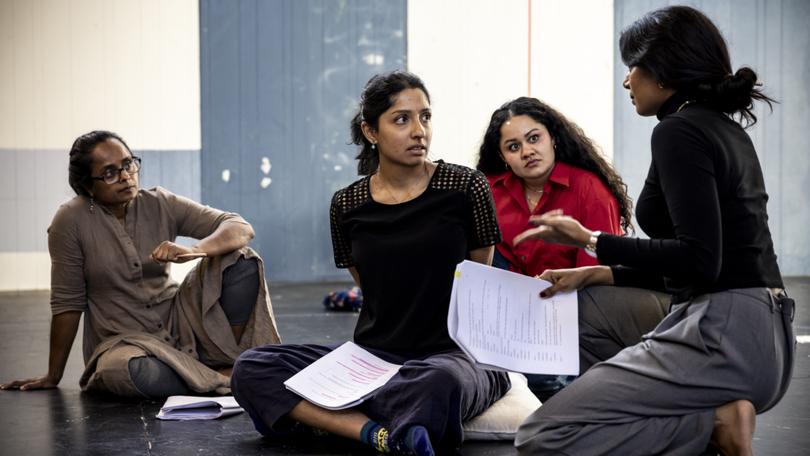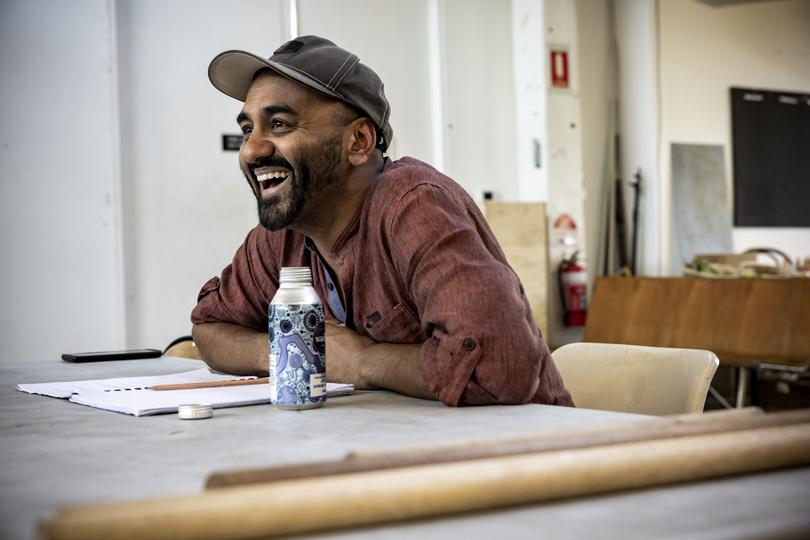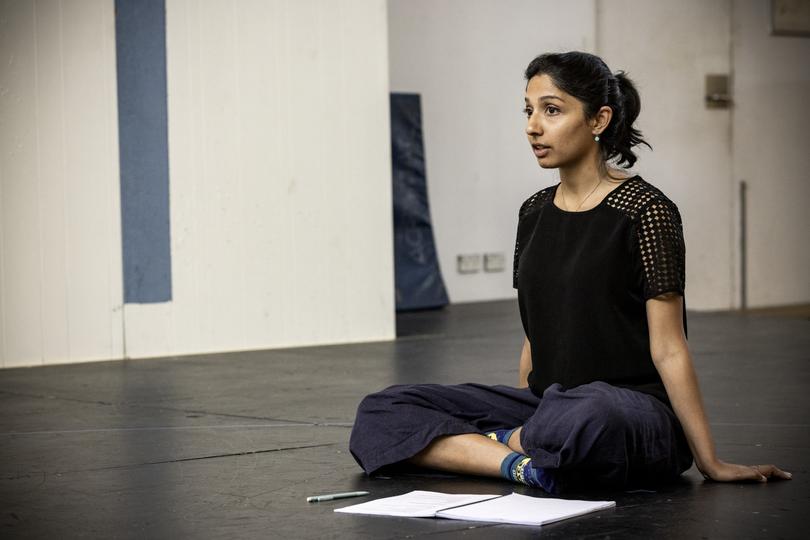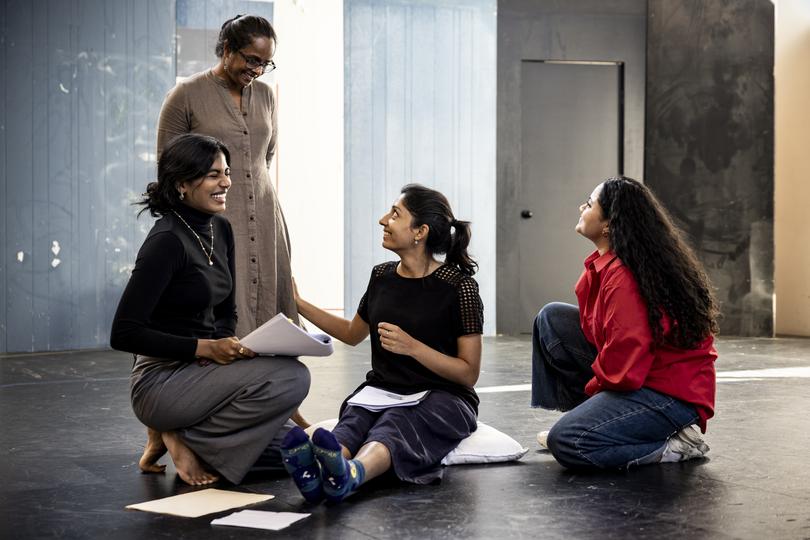The Wrong Gods at Belvoir St Theatre: S. Shakthidharan explores big ideas in his ‘first thriller’
From the acclaimed playwright behind Counting and Cracking is a new play that asks audiences to reconsider how they think about the world.

If there are wrong gods, does that mean there are correct ones?
That question is less about theology and religious faith and more about belief - belief in a system, belief in a way of life, belief that we make our own choices.
Playwright S. Shakthidharan wants people to ask questions. He did this in his acclaimed play Counting and Cracking, a multigenerational story about a Sri Lankan diaspora family in Australia, which played sold-out shows around Australia and then had a run in New York City.
Sign up to The Nightly's newsletters.
Get the first look at the digital newspaper, curated daily stories and breaking headlines delivered to your inbox.
By continuing you agree to our Terms and Privacy Policy.He will do it again with The Wrong Gods, which opens this week at Sydney’s Belvoir St Theatre. The Wrong Gods is a tighter play at only 90 minutes and with four characters, but the ambitions are just as grand.
The story is set in a small village in India, centred on a mother and daughter who grapple with the forces of change and modernity, and tradition and community. Shakthidharan is reluctant to reveal too much of the plot, but he is forthcoming on all the ideas and questions he hopes the play will provoke.
“I use art to try and solve problems that plague me, and I think that’s an optimistic action,” he tells The Nightly during rehearsals at Belvoir. “I didn’t realise until I said that to you, because I believe that there must be solutions, and it just takes thinking and feeling, more feeling than thinking, and then the process of writing allows one to arrive at those solutions.”

Answers to the biggest questions in life, and about life, is a big ask for a 90-minute play. Shakthidharan reconsiders this. “Let’s take away the word ‘solutions’. The process of writing allows one to arrive at the right questions,” he says.
“The solution is beyond theatre, but the right discussions is what theatre can do. It’s unlocking old habits and old ways of doing things.”
The core question Shakthidharan wrestled with is, “The idea of the gods we don’t know that we believe in”.
“What’s super interesting and perhaps more unsettling is the idea that we pray to and believe in systems with intense allegiance that we never clocked, that we never signed up for,” he explains. “We dressed up faith in the modern era as an act of individual choice, but our most deeply held faiths, we made those choices without realising.”
What are these systems he’s referring to? It could be modernisation, it could be “enlightenment”, it could be urbanisation, or progress, or globalisation. We accept these things are linked, but what if they don’t have to be?
“Somewhere around the late eighties, a bunch of world leaders started putting (progress and globalisation) together,” Shakthidharan says. “We went along with it. Not everyone, but yeah.
“They don’t have to be. It would be an interesting task to reclaim the idea, or the word ‘progress’, but that’s a very steep hill. But we could reclaim it from being shackled to the ideas of globalisation.”

The local and the global are not binaries in The Wrong Gods, but certain characters lean one way more than the other at various points. One of the four is Lakshmi, played by Vaishnavi Suryaprakash, who worked with Shakthidharan in Counting and Cracking.
Her character Lakshmi represents progress and the global, but how audiences relate to her will shift over the play. They might see her as the encroaching “other”, an interloper in a small community, but by the end, realise that’s who they are themselves.
Suryaprakash said Lakshmi’s story follows how a social system can start with excellent intentions, and how even being inside a system can change you without you realising it. When she first read Shakthidharan’s draft script, she felt she had been transported.
“The questions it asks, and the kind of complexity of knowing what to do, what the path forward is on every individual level was something that I had, at that point, been thinking about a lot,” she says.
“It was really exciting to read that and think, ‘Oh, this can be shared with more people because people are thinking about this. Shakthi was able to do in a way that seemed more hopeful.”
Lakshmi is not a villain, just as the audience members who will see themselves in her are not villains.
“We’re all that character, and it’s up to us whether we want to be honest with ourselves about that or not,” Shakthidharan says.
Honesty is key to the conversations he hopes The Wrong Gods provokes, but that involves audiences being willing to forsake the existing barriers we’ve erected around public discussions, whether it’s giving equal weight to “both sides” or the attention economy of social media.
“We don’t have to talk about this stuff like that anymore,” he says.

What we wants people to consider is the cost of progress – “Does everything in the world come at a cost or not? If it does, let’s be honest about how we choose who bears that cost?”, as well as accept that there are contradictions in truth.
That all sounds like The Wrong Gods might be some kind of third-year uni philosophy seminar, but the form in which those ideas are posed is crucial. It’s a play. “It’s a fun play”, Suryaprakash promises.
Shakthidharan says The Wrong Gods is the first thriller story he’s written, which means it’s propulsive and edge-of-your-seat stuff. It just happens to grapple with some deeper questions.
Whether it’s in theatrical form, in a fiction book, on TV or at the movies, storytelling and drama facilitates feeling something, rather than being told something. When we understand something through emotions, there’s a potency that a cerebral or intellectual framework lack.
We experience it, instead of just knowing it.
“The reason I’m not an essayist is because I don’t think humans can understand any of the stuff I’ve said, much less myself, if it’s in the form of an argument written on a piece of paper, or said in a presentation.
“We only properly understand things when we are able to see them inside the messiness of human experience.”
The Wrong Gods is playing at Belvoir St Theatre now and with the Melbourne Theatre Company at Arts Centre Melbourne from June 6

